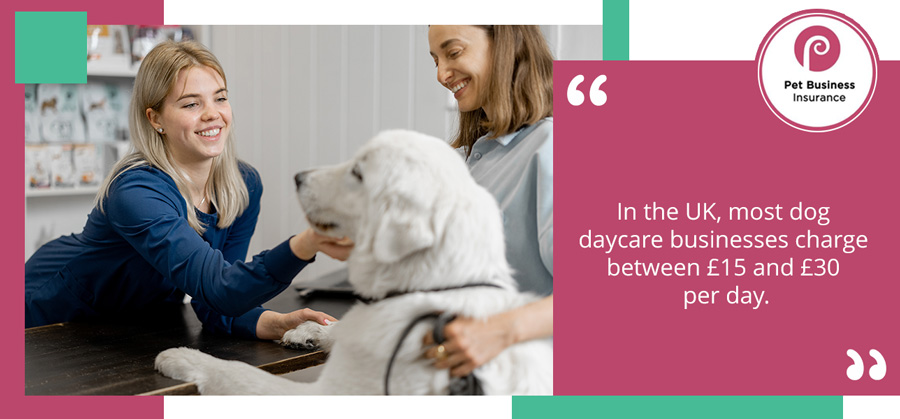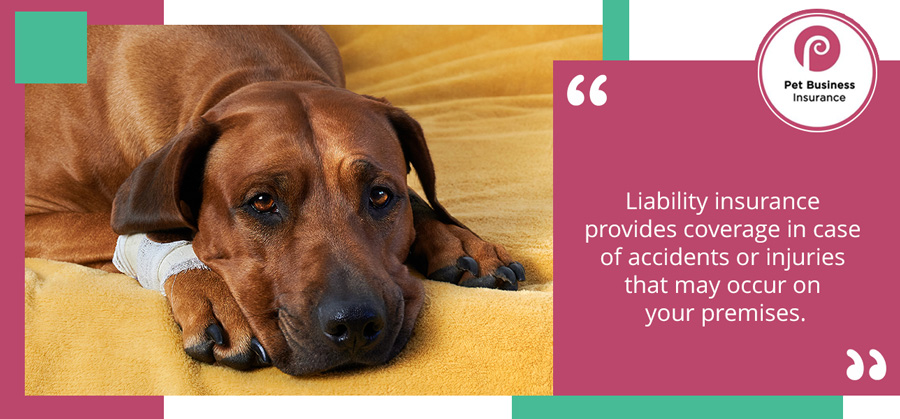
As of 2023, there are estimated to be 12 million pet dogs in the UK, up from 7.6 million in 2011. Expenditure on pets and pet related products in the UK has accounted for more than £9 billion in 2022, and continues to increase every year.
If you can invest a substantial amount of time each day watching over other people's dogs and feel at ease in their company, you might be a good candidate to open a dog daycare business in your area.
On the face of it, such a business may seem simple, but there is a lot to consider. Like any other business, it needs proper planning.
1. Do Your Market Research
Research the local market and competition to understand the demand for dog day care services in your area. By getting to know your potential customers and their needs, you can tailor your services to meet their expectations and stand out from the competition. Additionally, market research will help you determine pricing strategies, marketing tactics, and operational considerations.

2. Establish a Dog Daycare Business Plan
Setting up a dog daycare business requires careful planning and consideration. The first step is to create a comprehensive business plan that outlines:
- your goals
- target market
- services offered
- pricing structure
- marketing strategies
- financial projections
It is important to research the local regulations and licensing requirements for operating a dog daycare facility in your area.
Among the things you should include in the business plan are:
Defining Services
It is essential to clearly define the services you offer to potential clients.
Firstly, you should determine the types of dogs you are able to accommodate based on size, temperament, and any breed restrictions. This will help manage the playgroups effectively and ensure the safety and well-being of all dogs in your care.
Additionally, you may want to offer various services such as full-day daycare, half-day daycare, overnight boarding, dog walking, grooming services, and training sessions. Clearly defining these services will allow customers to choose the options that best suit their needs.
It is also important to establish policies regarding vaccination requirements, drop-off and pick-up times, behaviour expectations, and any additional fees or charges. By clearly defining your services and policies, you can provide a reliable and professional experience for both the dogs and their owners.
In the UK, such establishments are open seven days a week from 7 a.m. until 7 p.m. If you really want to stand out from the competition, you could also offer weekend services as well as emergency overnight stays.

Pricing for Services
Setting prices for dog daycare services can be a bit of a balancing act. On one hand, you want to make sure that your prices are competitive and affordable for pet owners. After all, they're entrusting you with the care of their beloved furry family members!
On the other hand, you need to ensure that your prices cover the cost of providing top-notch care and maintaining a safe and comfortable environment for the dogs. It's important to find a sweet spot where you can offer great value to your customers while also ensuring that your business remains sustainable.
By considering factors such as location, overhead costs, staff wages, and the level of service you provide, you can set prices that are fair for both your customers and your business.
At the end of the day, the goal is to create a happy and wagging community of dogs and their owners while also running a successful dog daycare venture. In the UK, most dog daycare businesses charge between £15 and £30 per day.
For those dog owners who use daycare facilities frequently, you may want to set up a recurring fee, either weekly or monthly.
A Detailed Financial Plan
Starting a dog daycare business can be an exciting and rewarding venture. To ensure its success, it's important to create a solid financial plan. First, you'll need to determine your startup costs, which may include renting or purchasing a facility, purchasing supplies and equipment, and covering initial marketing expenses.
Next, consider your ongoing expenses such as staff salaries, utilities, insurance, and pet supplies. As your business grows, it's wise to allocate funds for marketing efforts to attract new customers and retain existing ones.
Finally, don't forget about setting aside money for unexpected expenses or emergencies. By creating a comprehensive financial plan, you'll be well-prepared to navigate the financial aspects of running a successful dog daycare business.
Marketing
First, focus on building a strong online presence. Create a user-friendly website that showcases your facility, services, and testimonials from satisfied customers. Don't forget to optimise your website for local SEO, so when dog owners in your area search for day care options, your business pops up at the top of the list.
Use social media platforms like Facebook and Instagram to showcase the fun and engaging activities you offer at your dog day care. Don't forget to highlight the experienced staff members who will be providing top-notch care for each and every pup.
Collaborate with local pet shops or veterinarians to cross-promote each other's businesses. You can also offer incentives like referral programs or discounts for first-time customers to encourage repeat business.
Lastly, don't forget the power of local advertising. Consider placing ads in community newsletters, pet-related magazines, or even sponsoring local events or fundraisers. With a friendly approach and a well-executed marketing plan, your dog day care business is sure to thrive!
3. Hiring Staff
Starting a dog daycare business is an exciting venture, and finding the right staff is crucial for its success. When hiring staff for your dog daycare business, it's important to look for individuals who have a genuine love and passion for dogs. Look for candidates who have previous experience working with dogs, whether it's as a dog walker, trainer, or veterinary assistant.
Additionally, prioritize hiring staff members who are knowledgeable about dog behaviour and can handle different breeds and temperaments. It's also important to assess their communication skills and ability to work well in a team.
Don't forget to check references and conduct background checks to ensure the safety of the dogs in your care. By building a team of dedicated and knowledgeable staff members, you can provide a safe and enjoyable environment for furry guests at your dog daycare business.
4. Choosing a Location
The success of a daycare facility is highly dependent on location; if you establish it outside your target market, no one is going to travel far to drop off their dog.
Finding the right location takes time and effort, but you should stick to your budget and not spend too much initially on leasing or rent.
You should look for a place that has both indoor and outdoor facilities and plenty of space for the dogs to run and play.
In addition to cages and care equipment, your space must also include waiting areas, an information desk, and facilities for employees. The area should also be kept spotlessly clean as this will not only look attractive to customers but will also prevent the spread of diseases.
Pets should be kept in a secure location which should be properly fenced so that no dogs can escape and risk injury. Furthermore, you should ensure that no wild animals can enter the facility as this could cause untold problems.

5. Licenses and Insurance
If you want to avoid any legal issues, your business must comply with UK law. Get all the licenses before you begin and register all the necessary documents with the government. It is possible that an inspection team will pay you a visit to check the facility.
Consult your local council and a lawyer for advice and set up your business accordingly. By forming a company, you can grow and manage your employees and taxes more easily.
If you offer boarding services, you will need to apply for a boarding licence.
Insurance and Liability
it's important to understand the insurance and liability considerations involved to ensure the safety and well-being of both the dogs and your business.
Obtaining liability insurance is crucial, as it provides coverage in case of accidents or injuries that may occur on your premises. This not only protects your business from financial loss but also gives peace of mind to dog owners who entrust their beloved pets to your care.
In addition to liability insurance, it's a good idea to have property insurance to protect your facility from potential damage or loss. By taking these steps, you can create a safe and secure environment for furry friends while protecting your business from unforeseen risks.
6. Dog Daycare Rules
There are certain daycare rules you must set regarding dogs and customers so that your business runs smoothly. Establishing these rules will protect you from liability and ensure that your operations are standard. Here are some common rules:
Most dog daycare facilities won't accept adult dogs that haven't been neutered or puppies that are too young. Therefore, you should specify the age bracket you will accept as some age groups require additional supervision and care.
Vaccination: Dogs must have up-to-date vaccinations and a certificate must be provided by the owner, such as CDV, CPV, and CAV, which cause canine distemper, parvovirus infection, and infectious hepatitis.
Behaviour: An interview or trial period is recommended before accepting a dog because aggressive dogs are difficult to control and can harm other dogs or puppies.
Conclusion
Tens of dog daycare businesses are opening in the UK every day. If you love dogs and have an entrepreneurial mindset, starting one could be the most fulfilling experience of your life.